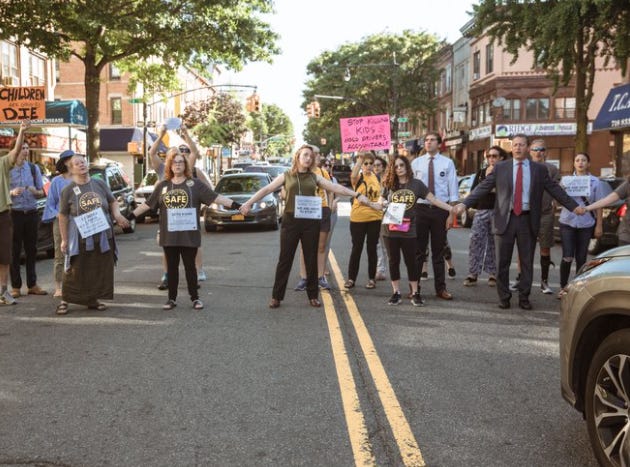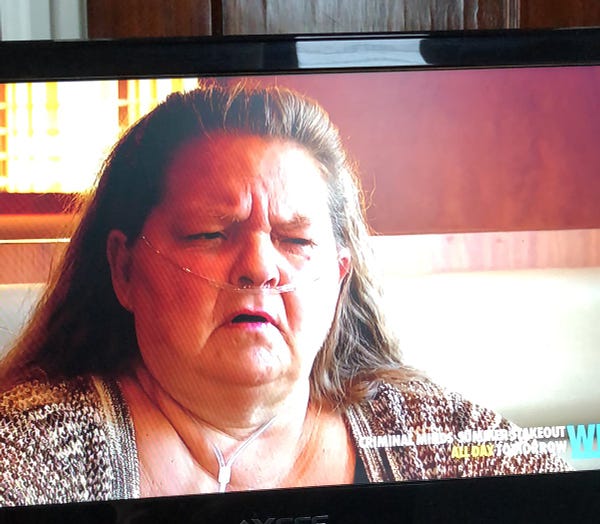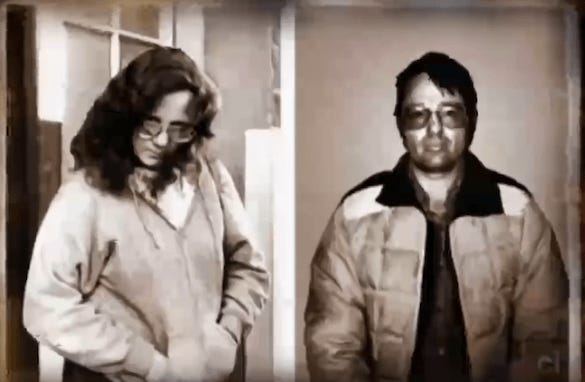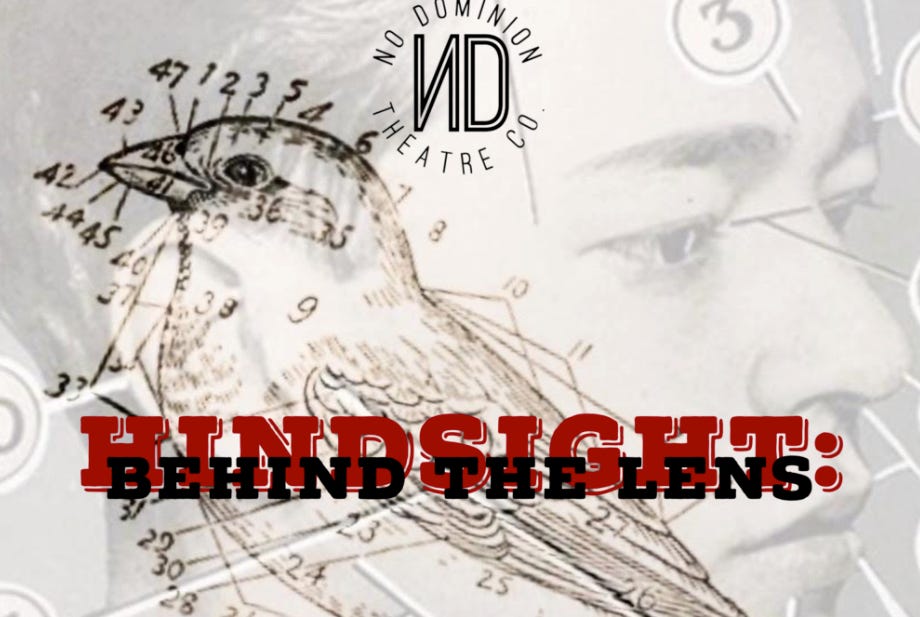The Girl In The Box · Love After Lockup · Crooked Brooklyn
Plus "New Yorker" longreads, true-crime opera, and Netflix coming attractions.

Greetings from that inexplicable red wad on the New York City map. It’s not looking great for blue-hearted citizens of Bay Ridge, but as we wait for the last of the votes to get counted, let me situate non-New Yorkers: I live a few blocks inland from the big mansions in this Hey Ridge piece, and a few blocks from both the exterior of the Manero home in Saturday Night Fever and the paint store where Tony works. The district also has a “proud” tradition of electing sketchballs, including Michael Grimm (mail, wire, and health-care fraud), Vito Fossella (got a DUI en route to visit his secret family), and Marty “Not So” Golden (ran over an old lady in his Chevy Blazer). Having gotten angrily heckled during a BLM march this past summer, I had a better sense than some Brooklynites of where all this was headed, but it’s still difficult, and as the philosopher Tom Petty noted, the waiting is the hardest part. Hang in there; I’ve got a few recs for you today. — SDB
Before Best Evidence, before The Blotter Presents, even before the Blotter blog, there was the Virtual True Crime Book Club. Various friends and esteemed colleagues (hey, T-Bone) read one true-crime book a month, then met in a free chat room to discuss it — and if this is a service you’d like Best Evidence to provide, let me hear from you!
A cocktail/coffee hour and some conversation and connection in these troubled times might really hit the spot — and while I don’t remember all the books we talked about, I definitely remember Perfect Victim: The True Story of “The Girl in the Box.” Mostly I remember how judgy we…well, how judgy I was about Colleen Stan’s story. Why were women still hitchhiking in the late seventies? Why didn’t she run off when she had the chance? What kind of sick collaborator was Cameron Hooker’s wife Janice?
Ten-odd years after the VTCBC convo, we know so much more as a culture about this kind of crime and the psychology of its victims, and A&E’s Real Crime blog got into that psychology in a piece on the case from last week. (CW: The particulars, despite various cheesy details involving waterbeds, are disturbing, so click with care.) I’d recommend the book, if you see it on a used-bookstore shelf for a reasonable price; I don’t remember it as particularly well written, but it moved right along, and the frustration I felt on Stan’s behalf was compelling.
And TIL a scripted movie got made about the case in 2016. Girl In The Box has no real names in it (“Addison Timlin of Zero Hour” is a thing I just typed; the guy playing Hooker, Zane Holtz, starred in Katy Keene, and Robin Williams’s daughter Zelda is Janice), but I’m not UN-interested in seeing how writer-director Stephen Kemp, whose c.v. is mostly TV docs like Paranormal Witness and Locked Up Abroad, would walk the tightrope of an accurate depiction of events that doesn’t give in to sensationalism. Anyone seen this one? Anyone want me to see it? — SDB
I wish I’d known about the “virtual deconstruction” of an opera about Leopold and Loeb six weeks ago! I’d have linked to it and watched it myself; now it’s unclear how one might access the Zoom event that New Jersey’s No Dominion Theatre Co. put together to “take audiences ‘behind the lens’ of the infamous ‘crime of the century.’” Composer Felix Jarrar talks about the work in an NJ.com piece, but — though I’ve gone to exactly one opera in my life and know little about the genre — I’d really have liked to see a process-y conversation about how crime stories get “translated” to music, be it opera, more contemporary musical theater, or murder ballads. — SDB
Consider burning one of your monthly Condé views on Masha Gessen’s New Yorker piece on the ACLU’s Chase Strangio. The article appeared in the mag’s October 19 issue, under the Annals Of Activism banner, and as such it’s a solid explainer on activist law generally, and Strangio’s “corners” specifically. Here’s a snip:
Strangio, who graduated from law school in 2010, has worked on some of the most important civil-rights cases of recent years, especially in the area of transgender rights. His clients have included Chelsea Manning, the U.S. Army whistle-blower, and Gavin Grimm, the Virginia high-school student who sued his school district for the right to use the bathroom that corresponded to his gender identity. Strangio has achieved a sort of celebrity as a lawyer and a trans activist. Last year, Annie Leibovitz photographed him for a Google ad campaign, and this summer he appeared in two new documentaries: “Disclosure,” which looks at portrayals of trans people in film, and “The Fight,” which profiles five A.C.L.U. attorneys battling the Trump Administration on various fronts, in which Strangio is featured with his colleague Joshua Block as they craft a case against Trump’s ban on transgender military personnel.
A solid issue all around — Marantz on Facebook’s fake-news “problem,” Lane on John Berryman, Lauren Michele Jackson on Dolly Parton bios — so open an incognito browser window and go to town. — SDB


I don’t know what it says that I chose to avoid election coverage yesterday with a Love After Lockup marathon. Nothing good, I’m sure, but I stand by my positive comments about the show back when I discussed its semi-spin-off, Life After Lockup, with Piper Weiss on TBP Ep 128:
WEtv is probably most focused on … rubbernecking in order to grow the shows’ audience — but there’s an almost accidental commentary on the difficulties of life on parole, what happens when you sentence teenagers and parole them decades later with no life skills, the growing population of parolees who can’t get jobs or move around, etc. and so on. There’s also Angela, a whiskey-voiced tragedy who should really ditch Tony and become an audiobook narrator.
I’m still working my way through the episodes stacked up like cordwood on my DVR (and as I continue, you can follow my commentary on our Twitter), and the pandemic has begun to make itself felt in various ways, from halfway-house arrangements getting scuttled (oh, Scott) to seemingly already doomed couples forced to make the best of their bad decisions thanks to lockdown (ohhhhh, Scott) — so in that way, the show continues to reflect various ugly realities and vicious cycles that 2020 has only spotlighted and sped up. (In the plus ca change department: ohhhhhhhh, ANGELA. I still root for her, though. I would listen to a whole call-in advice podcast starring her and Donna Faye.)
And then there’s Heather. Heather showed up fairly late in the summer run of Love After, but this pink-haired child of God set off my cringe-dar almost immediately; I haven’t gotten to the newer eps yet, but according to Starcasm (spoilers ahoy), it…isn’t going to end well for Heather, probably because things…don’t, for her.
In any event, I’ll be continuing to chip away at the backlog today while waiting for election news, so feel free to join me in a catch-up, and let me know your thoughts here or on Twitter. (By which I mean “order me not to go down a YouTube rabbit hole with those True Confessions webisodes.”) — SDB
Let’s wrap it up with a couple of trailers for upcoming Netflix properties I’m looking forward to. I’d hoped to get a screener of Carmel: Who Killed Maria Marta? to cover it for Primetimer; that didn’t occur, but I’m still eager to watch this doc on “one of the most controversial criminal cases in Argentina”:
Carmel hits Netflix tomorrow, November 5.
Also can’t wait to dive into Trial 4, whose title refers to the fourth trial of Sean Ellis for the murder of a Boston police officer (Ellis was convicted — wrongfully, he has always maintained — after Trial #3). The eight-episode order spiked a brow for me, I won’t lie, but with Jean Xavier de Lestrade (The Staircase) exec-producing, I’ll try to maintain an open mind.
This one hits the streamer next week, November 11. — SDB
Thursday on Best Evidence: Loughlin’s life in lockup, a Mostly Harmless longread, and more.
What is this thing? This should help. Follow Best Evidence @bestevidencefyi on Twitter and Instagram. You can also call or text us any time at 919-75-CRIME.





John Berryman! I wrote my undergrad thesis on portents of suicide in the works of Berryman, Plath, and Hart Crane.
I am interested in the book club, were it to happen here.
YES PLEASE to the book club, I need something to look forward to today.